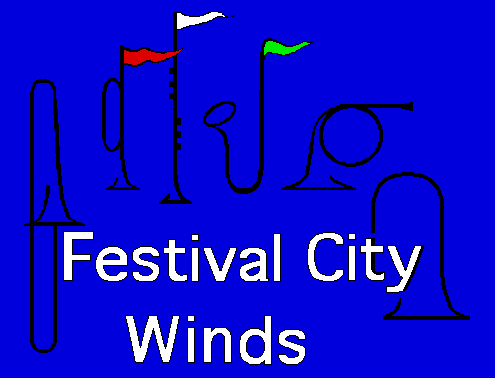Links
The Concert Band Menagerie
An introduction to the various instruments of the concert band has been compiled by Graham Nasby
and may be found
here.
A History of the Wind Band
Dr. Stephen L. Rhodes of Lipscomb University has created an interesting web site that describes
the development of the wind band from the Middle Ages up to the present.
Click here.
The Band Grading System
A music grading chart prepared by The American Band College may be found
here.
Music Organizations - Edmonton and Vicinity
Music Organizations - Alberta
Music Organizations - Canada
Many Additional Links to other bands may be found at the following sites:
Music Jokes
By instrument (in score order)
Q: How do you get two flutes to play in tune?
A: Shoot one.
Q: What is an oboe good for?
A: Kindling to set a bassoon on fire.
Q: How many clarinetists does it take to change a lightbulb?
A: Only one, but he'll go through a whole box of bulbs before he finds just the right one.
Q: What's the difference between a saxophone and a lawn mower?
A: 1. The grip. 2. You can tune a lawn mower.
Q: How many trumpet players does it take to change a lightbulb?
A: Five. One to handle the bulb and four to tell him how much better they could have done it.
Q: How can you make a trombone sound like a french horn?
A: Stick your hand in the bell and play a lot of wrong notes.
Q: How can you tell which kid on a playground is the child of a trombonist?
A: He doesn't know how to use the slide, and he can't swing.
Q: What do you call a euphonium player with a beeper and a cell phone?
A: An optimist.
Q: What's the range of a tuba?
A: Fifteen yards if you've got a good arm!
Q: Why are band concert intermissions limited to 20 minutes?
A: So you don't have to retrain the drummers.
(original author unknown)
Music Definitions
- detaché: an indication that the trombones are to play with their slides
removed.
- subito piano: indicates an opportunity for some obscure band player to
become a soloist.
- risoluto: indicates to orchestras that they are to stubbornly maintain the
correct tempo no matter what the conductor tries to do.
- senza sordino: a term used to remind the player that he forgot to put his
mute on a few measures back.
- crescendo: a reminder to the performer that he has been playing too
loudly.
- conductor: a musician who is adept at following many people at the same
time.
- bar line: a gathering of people, usually among which may be found a
musician or two.
- beat: what music students do to each other with their instruments. The
down beat is performed on top of the head, while the up beat is struck under
the chin.
- diatonic: low-calorie Schweppes.
- virtuoso: a musician with very high morals. (I know one)
- tenor: two hours before a nooner.
- perfect fifth: a full bottle of Jack Daniels.
- diminished fifth: an empty bottle of Jack Daniels.
- relative major: an uncle in the Marine Corps.
- tempo: good choice for a used car.
- A 440: the highway that runs around Nashville.
- cut time:
1. parole.
2. when everyone else is playing twice as fast as you are.
- passing tone: frequently heard near the baked beans at family barbecues.
- middle C: the only fruit drink you can afford when food stamps are low.
- perfect pitch: the smooth coating on a freshly paved road.
- tuba: a compound word: "Hey! Fetch me another tuba toothpaste!"
- cello: the proper way to answer the phone.
- time signature: what you need from your boss if you forget to clock in.
- staccato: how you did all the ceilings in your mobile home.
- plague: a collective noun, as in "a plague of conductors."
- accidentals: wrong notes.
- interval: how long it takes to find the right note. There are three kinds:
1. Major interval: a long time.
2. Minor interval: a few bars.
3. Inverted interval: when you have to go back a bar and try again.
(original author unknown)
| 
_1_200x274.jpg)